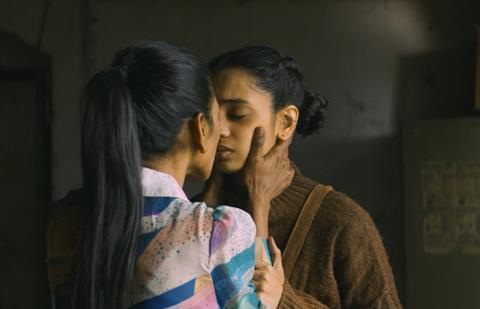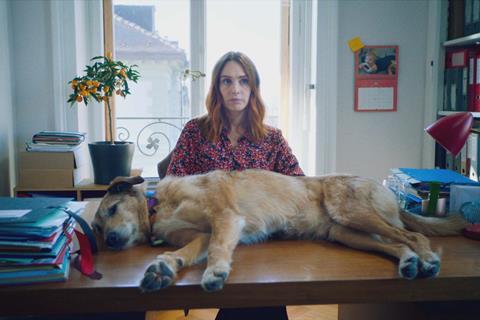Switzerland is making a name for itself as an innovative and sustainable production hub with a multilingual workforce of producers and a cutting-edge tech and facilities sector.

As the country in focus at the Cannes market this year, Switzerland’s content, talent, start-ups, funding organisations and facilities are bonding with the international industry on the Croisette.
Indeed, Switzerland is enjoying its moment in the spotlight. It is gearing up to host the European Film Awards on December 7 in the city of Lucerne, and is only the third country to be highlighted at the market, following India in 2022 and Spain last year.
Four films in official selection are co-productions with Switzerland, each highlighting the skills and financing that a Swiss producer can bring to an international project.
For films working with a Swiss production company, there are various sources of funding available at a national and regional level and from the private sector in Switzerland. The main one is the Film Investment Refund Switzerland (PICS), a programme focused principally on Swiss-international co-productions. Administered by the Federal Office of Culture, PICS refunds 20%-40% of eligible film production expenses if a project shoots for a minimum of five days in the country. An 8.1% VAT rate on production spend is also offered.
Then there is Cinéforom — Fondation romande pour le cinéma, a regional fund created in May 2011 for the French-speaking part of the country. Switzerland can also officially co-produce with 45 countries through bi- and tri-lateral agreements or the European Convention on Cinematographic Co-production, and is a member of Eurimages and the Council of Europe. However, it is no longer part of Creative Europe Media.
Festival spotlight
Bulgarian director Konstantin Bojanov’s third feature The Shameless is in Un Certain Regard. Co‑produced with Geneva-based Akka Films, the feature is set and shot in northern India, and is a love story about two women who must wrestle with an oppressive society rooted in centuries-old patriarchal traditions.
Akka Films, led by founder and filmmaker Nicolas Wadimoff and producers Philippe Coeytaux and Juliana Fanjul, is the lead producer on the Switzerland-France-Bulgaria-Taiwan collaboration. The India co-producer is Team Productions HQ. Akka became involved with The Shameless in 2018 when producer Palmyre Badinier moved to Akka from French production banner Urban Factory, where the project was being developed, and wanted to continue working on it.
“At Akka Films, we prefer to work in depth on our films, and seek to work together, production and direction, hand in hand,” Coeytaux says. “We come from both production and directing backgrounds, which we hope will enable us to consider all situations in a relevant and well-informed way.”
Akka’s involvement unlocked Swiss financing. The film was not eligible for PICS as it did not shoot in Switzerland, but Coeytaux says it accessed other selective funds, including from regional fund Cinéforom and Swiss broadcaster SRG SSR.
“Being a producer is hard anywhere on the planet,” says Coeytaux. “At least in Switzerland, we have the possibility to finance our films with soft money.”

Also screening in Un Certain Regard is Swiss actress-turned-filmmaker Laetitia Dosch’s Dog On Trial. From a script by Dosch and Anne-Sophie Bailly, the Switzerland-France co-production tells the true story of an idealistic lawyer dedicated to lost causes who agrees to defend a dog that has bitten three people. This leads to the first canine trial in history (see feature, page 20).
Produced by France’s Atelier de Production, the outfit behind Quentin Dupieux’s films, and Switzerland’s Bande à Part Films, Dosch wanted to shoot her directing debut in her home country. Bande à Part’s Lionel Baier, based in Lausanne, knew Dosch’s work ethic through her acting credits. “She has a great capacity for work,” Baier notes.
Shot in Lausanne, Vevey and the rural region of Côte, all in the French-speaking Swiss canton of Vaud, Dog On Trial is a majority Swiss co-production, accessing “most of the production incentives” offered in the country, according to Baier. Funding came from sources including PICS, RTS, SRG SSR and Cinéforom.
“Filming in Switzerland is a little more expensive than in other European countries, but not as much as you might imagine,” says Baier, who describes Switzerland as very film-friendly. For example, Baier says social charges for technicians can be lower than elsewhere and the authorities are accommodating when it comes to filming on the city streets or in public buildings.
Switzerland-based Spanish visual artist and filmmaker Elena Lopez Riera’s short documentary Southern Brides (Las Novias Del Sur) is premiering as a special screening in Critics’ Week. It features middle-aged women talking about marriage, sex, sexuality and intimate relationships. The filmmaker questions her own lack of marriage, children and how the chain of mother-daughter relationships is dying out. It is a co-production between Swiss outfit Alina Film and Spain’s SUICAfilms.
Alina Film co-founder Eugenia Mumenthaler has worked with Lopez Riera for many years, co-producing her debut feature film The Water (El Agua) with SUICAfilms, which screened in Directors’ Fortnight at Cannes in 2022.
“We shot in Spain, in various cities,” says Mumenthaler, but adds that they managed to access PICS funding from Switzerland. “It’s hard and competitive everywhere, but we have a financing system that in my opinion — and compared to other systems we have worked with — works well.”
Trailblazing animation
Also in Special Screenings is Claude Barras’ animated feature Savages. The stop-motion feature is a co-production between Zoltan Horvath and Nicolas Burlet’s Geneva-based Nadasdy Film with France’s Haut et Court and Belgium’s Panique. It follows the story of an 11-year-old girl — voiced by Laetitia Dosch — who lives with her father on the island of Borneo and believes her late mother was eaten by a panther.
It is one of the first projects to be supported by the Swiss canton of Valais through the Valais Film Commission’s automatic cash rebate scheme. Feature-length fiction and animated films or series that shoot for at least five days in the Valais region and generate at least $114,000 (chf100,000) of eligible expenses qualify for a 15%-35% rebate.
The Swiss Hub showcases the country’s leading products and technologies
Swiss tech companies and start-ups are at the forefront of innovation in the visual arts, specialising in artificial intelligence (AI), virtual and augmented reality, extended reality and virtual production, which has attracted the Cannes market. “Switzerland is a very innovative country in terms of creativity and technology, which aligns perfectly with the positioning of the market,” says Guillaume Esmiol, executive director of the Marché.
Industry networking events, conferences and roundtable talks are taking place throughout the market. At the Swiss Hub, products and technologies created by Swiss start‑ups — such as digital AI avatar software developer Copresence and Largo.ai, the Switzerland-based firm that aims to accelerate content development with AI-powered insights — are being showcased.
Also in town is Sensoryx, a start-up working in the metaverse, and motion-control specialists Superposition and UDIMU, which specialises in immersive, multisensory interactive experiences. Film Commission Zurich is an innovation partner of the Swiss Hub, and is supporting the city’s start-ups Copresence, Sensoryx and Superposition.
Swiss Innovation Day is taking place on May 19 during Cannes Next, the conference and innovation-driven business development platform. Swiss Films is hosting a half-day panel at the event named ‘The Future of Storytelling — Crafting Immersive Narratives’ on the Palais Stage. The panel discussion, which will also be available to view online, will delve into the production and distribution of immersive works from a variety of perspectives.
Hosted by Laetitia Bochud, managing director of Virtual Switzerland, the speakers include Anaïs Emery, artistic and executive director of Geneva International Film Festival and Geneva Digital Market, and Simon de Diesbach, the Swiss director, screenwriter, lighting designer, 3D animator and cinematographer.
Also in conversation will be Salar Shahna, director of business development at Sensoryx and Antoine Cayrol, founder and producer at Atlas V, which specialises in the development, production and distribution of virtual, augmented and mixed‑reality works.















![[L-R]: Amanda Villavieja, Laia Casanovas, Yasmina Praderas](https://d1nslcd7m2225b.cloudfront.net/Pictures/274x183/6/4/1/1471641_pxl_20251224_103354743_618426_crop.jpg)









No comments yet